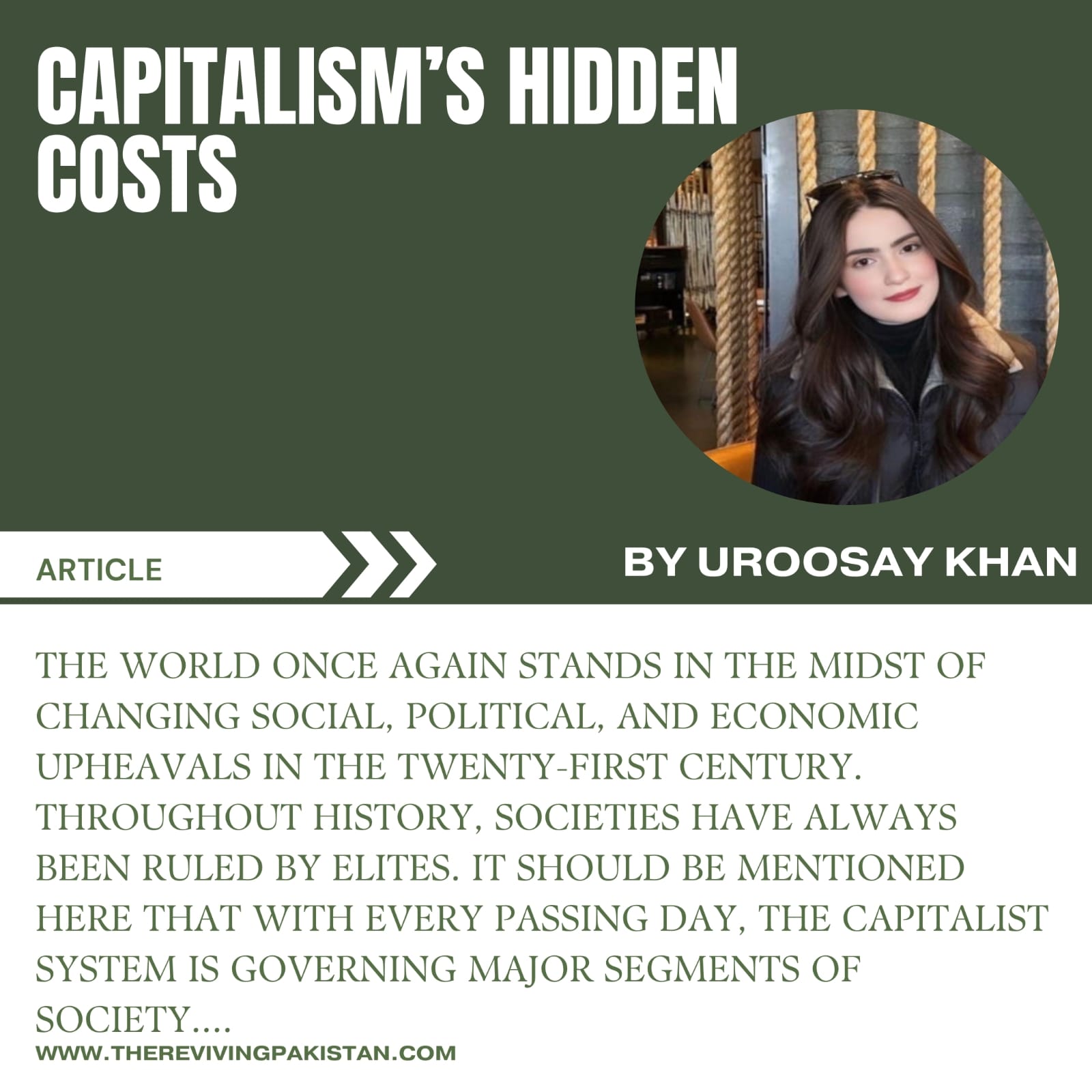About the Author(s)

Uroosay Khan
The author is an independent researcher having keen interest in psychology, foreign policy, geopolitics, and international relations.
The world once again stands in the midst of changing social, political, and economic upheavals in the twenty-first century. Throughout history, societies have always been ruled by elites. It should be mentioned here that with every passing day, the capitalist system is governing major segments of society. No single age of humanity has passed without changing equations, revolutions, protests, and social movements. The industrial revolution came with manifold benefits and problems for humans. Similarly, the increasing negative impacts of capitalism on farmers, the destitute, the poor, laborers, and the overall social structure of society have also given fuel to thoughts and philosophers regarding the destiny and survival of such fragments of society. Among them were Marxist thinkers who severely lambasted the egoistic directions of capitalist elites. The division of labor and the worsening conditions faced by poor people in a capitalist society where elites exploit them in almost all aspects have been mentioned earlier in the theories by Marxist philosopher Karl Marx.
Mark Fisher raised uncompromising capitalism theory, which comes in line where he mentioned that capitalism is affecting each area of the social spectrum. It is reaching art, literature, media, and social, political and psychological areas also. This way, capitalism has dictated the lives of individuals by shaping their thoughts, ideas, and belief. In the political context, a small elite controls the political decision making processes and sponsors the political parties for polling, election campaigns and lobbying. It thus suffices to say that the dollar in your pocket determines how many votes you have; if you have millions of dollars, you have millions of votes, and if you do not have any dollar in your pocket, then you have no votes.
Coups d’état were organized by the United States with an eye on states whose socialist regimes wanted to topple them in order to extend the working field of capitalism. Noam Chomsky, a scholar, rightly commented that the US-led capitalist regime exploited the poor and reached its last stage. However, with the beginning of industrialization in the Western world, peasants, the poor, and other downtrodden sections of society sustained exploitation. This development included expropriation of land, eviction of peasants from their land, converting it into private property, and turning the evicted ones to wage laborers. Thus, resources and labor from the traditional communities were concentrated into the hands of a few capitalists.
The capitalist system has wholly failed to provide solutions for the increasing challenges the world is combating in the 21st century. Inequality is augmenting and, with it, increasing gap between the core and peripheral countries in terms of development. Environmental degradation takes place. Unfortunately, one can use the term that the influence of the capitalist system in difference sections of society will reduce the strength and courage needed to curb harmful gas emission and fix the emerging issues caused by the capitalist systems in the twenty-first century.
Maybe one of the most glaring problems associated with this system is growing economic inequality among citizens. In the plight of relentless growth of profit, Capitalism results in a concentration of wealth, that leaves most struggling for mere basic needs. Rich get richer, poor become poorer. This disparity is not just a matter of social concern; it is actually an intrinsic flaw in the economic system and fertile ground for social unrest and general instability.
More than that, the effect of capitalism on the environment cannot be negated. Relentless exploitation of natural resources has been the case up to the point whereby severe environmental degradation has reached alarming levels. Deforestation, pollution, and climatic change have been direct results of a system that fronts short-term gains at the cost of long-term sustenance. Consumerism is what drives capitalistic models; it encourages throwing away and over-consumption, thus doing little but worsening the ecological crisis on the planet.
Capitalism also has a huge bearing on culture and the media. Commodification of culture leads to the homogenization of global culture, whereby the diverse local traditions and identity formations are replaced by the hegemonistic capitalist culture. Media conglomerates, driven by the profit motive, control the narratives and mold public opinions at the cost of truth and diversity in thinking.
Politically, it has fostered elite power. The political influence that rich people or big corporations are able to exercise weakens democracy, whereby policies are always designed with an aim to favor the rich at the expense of being for the majority. It creates an uneven political field whereby the interests of the many are sidelined in favor of the few through lobbying and political donations.
These difficulties have returned the interest to alternative systems of economy. In its central concern with just distribution of resources and social welfare, socialism offers an absolutely credible alternative to these. Models of social democracy in Scandinavian countries, combining bits of capitalism with huge safety nets, showed that economic growth need not come at the expense of social equity.
Moreover, the development of more cooperative/complementary economic models fundamentally based on principles of welfare, conservation, and mutualism raises new hopes for inclusiveness toward a viable future. These models move consideration toward the well-being of people and the health of the planet from an afterthought to what is required before everything else takes place: local development and environmental stewardship.
Concisely put, though capitalism has been a driver of economic growth and technological change, such sustainable development also introduces innumerable social, economic, and environmental problems. Increasing poverty, environmental degradation, and erosion of democratic values by this system are challenges presented. There is a dire need to look for alternative models and struggle for their implementation by equity, sustainability, and well-being to all members of society. The future depends on our ability to adapt and create systems that serve the common good, not just the interests of a privileged few.


1 comment
Loved your opinion
Great work MashaAllah ❣️
Comments are closed.